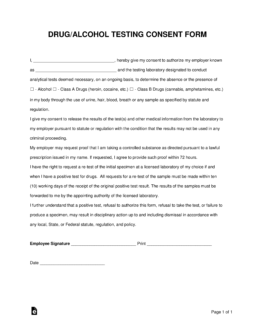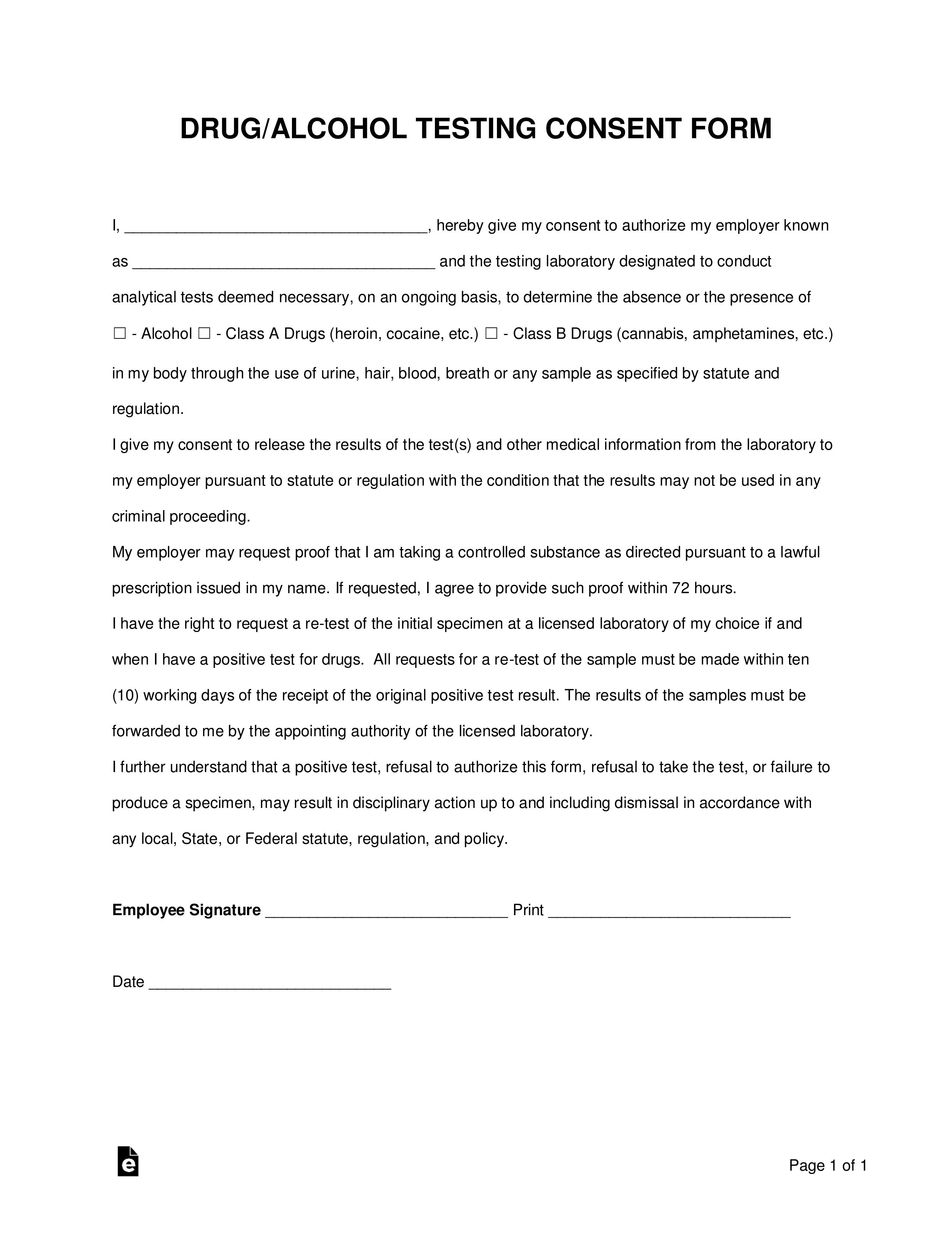Updated September 19, 2023
A drug and alcohol testing consent form is used by employers to screen applicants and employees for drug and/or alcohol use. This form may also be justified by reasonable suspicion of drug or alcohol abuse. Within the form, the employee gives the employer permission to test their urine, hair, blood, or any other physical sample for indicators of substance abuse. In accordance with the law, refusal on the part of the employee to fill this form can result in their termination.
Common Types of Drugs Tested
No single drug test will catch every substance. To be practical, employers often follow the standards set by the federal Substance Abuse and Mental Health Services Administration (SAMHSA) and screen for five common categories:[1]
- Amphetamines
- THC
- Cocaine
- Opiates
- Phencyclidine
Amphetamines are a class of stimulants that includes meth and speed, THC is the psychoactive ingredient in marijuana, cocaine and opiates are familiar “hard drugs,” and phencyclidine is popularly known as PCP or angel dust.
While employers sometimes screen for other substances like barbiturates, inhalants, MDMA (ecstasy), or anabolic steroids, these broader tests are usually more expensive.
The point of the testing is to identify illicit substances in the system. Though some opiates and amphetamines are available by prescription and used for legitimate medical interventions, most of the indicated drugs are illegal in all cases.
One major exception is alcohol. Even though alcohol is legal for those over 21, employees are usually barred from drinking on the job or otherwise being under the influence during work hours. Certain jobs – especially those in transportation or heavy machinery – often include alcohol screening among their employment protocols. Unlike most other substances that leave traces in the blood long after use (known as “metabolites”), alcohol only shows up if it has been recently consumed. Testing positive for alcohol does not imply intoxication – but it does mean that you are at least marginally “under the influence.”
Random Testing
Workplace drug testing may either be across-the-board, random, or on an as-needed basis when reasonable cause exists to suspect that an employee is using.
Random testing is a popular deterrence strategy. If it is conducted regularly and systematically, it can help to eradicate substance use from the workplace.
Since these tests are not based on reasonable suspicion or any other evidentiary basis, it is essential that the selection process be truly random. This might mean drawing names out of a hat or using a computer – but workers cannot be chosen on a whim.
Note that not all states permit random testing. In some jurisdictions, random tests are reserved for certain professions characterized by risk or responsibility, while others ban it wholesale.
Even when random testing is legal, it is subject to normal testing regulations. Employers must notify workers of the testing protocol; in some cases, the workplace may even be required to announce the date of a future test.
Pre-Employment Drug and Alcohol Testing
Some employers include a drug test in their screening process for job candidates. While laws vary between states, employers are usually required to notify applicants at the outset of the hiring process that they may be tested.
In most states, employers can only test a candidate as a last step before making an offer. Though it would not be cost-effective anyway, states generally ban blanket testing of all applicants.
Drug Testing Laws
Laws vary by state and industry.[2] Generally, tests can only be performed with consent. This does not mean that an employee can necessarily decline a test and hold onto their job, but it does mean that workers should be informed of policies in advance of testing.
The conditions for conducting workplace drug testing depend on the state or other jurisdiction, and the nature of the industry and the specific position. In certain contexts, universal testing in the rule, while in other cases, only random screening is permitted. Some jurisdictions only permit testing when there is a reasonable suspicion that an employee is using drugs, or other specific cause, such as an on-the-job accident.
There are special circumstances where the consent rule and other constraints might not apply. Parents may test minor children, and the police can compel a sample from a suspect with a court order. Insurance claimants and others who have been involved in accidents may likewise be asked to submit to drug and alcohol testing as a condition of receiving a payout.
Remember that lab results are not bulletproof. The law usually requires that a first failed drug test be confirmed with a second test to rule out a “false positive.” Employees may also have to right to contest results, though it can be difficult to argue against two failed tests.
Drug test results are like medical records and should be treated confidentially. It does not matter whether an employee tests positively or not – this personal information cannot be released or otherwise used for anything other than the authorized purpose.
FAQs
Can a Doctor do a Drug test Without Consent?
In general, doctors cannot drug test without a patient’s consent. There are two main exceptions: First, if the patient is underage, a parent can authorize the test even over the patient’s objection. Second, if the patient is incapacitated – perhaps arriving by ambulance at the ER – the hospital may drug test to determine if any intoxicating substances are in the mix.
Can my OB-GYN Drug Test Me Without Consent?
The same rules apply to OB-GYN’s as to other medical practitioners. Consent is a requisite for conducting a drug test. While a state child welfare agency might require that a pregnant woman submit to testing as a condition of maintaining custody, unauthorized testing of pregnant women was deemed unconstitutional in a 2001 U.S. Supreme Court case.
Can a School Drug Test You Without Consent?
Possibly. This is a controversial issue, with court rulings on both sides of the matter. While the Supreme Court approved testing for athletes and others involved in competitive extracurriculars, testing without consent is a case-by-case question without a clear precedent.


